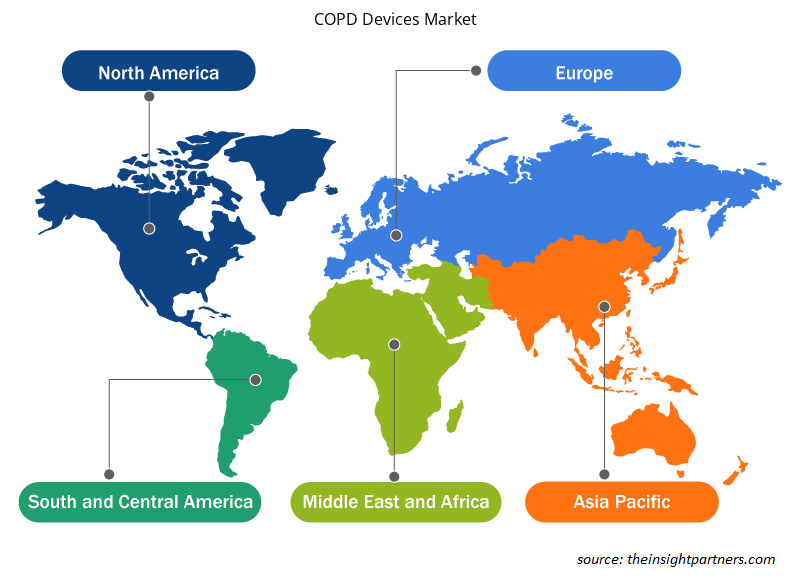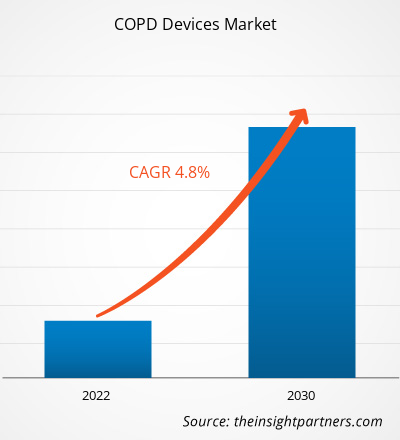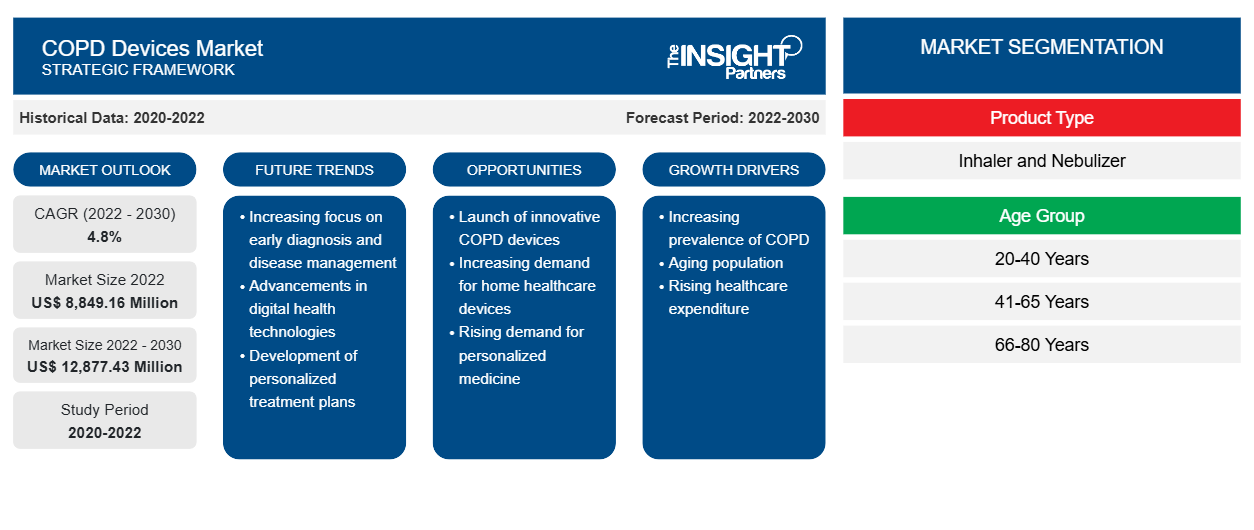[Informe de investigación] Se espera que el mercado de dispositivos para la EPOC crezca de US$ 8.849,16 millones en 2022 a US$ 12.877,43 millones en 2030; se anticipa que registre una CAGR del 4,8% entre 2022 y 2030.
Perspectivas del mercado y opinión de analistas:
La EPOC es una enfermedad crónica que provoca inflamación pulmonar, daña el tejido pulmonar y provoca el estrechamiento de las vías respiratorias, lo que dificulta la respiración. El tamaño del mercado de dispositivos para la EPOC se está expandiendo con el aumento de las actividades de I+D para desarrollar inhaladores inteligentes para el tratamiento de la EPOC, el aumento del número de casos de EPOC y el aumento del apoyo gubernamental para el tratamiento de la EPOC. Además, la disponibilidad de productos avanzados por parte de los actores del mercado está impulsando aún más el crecimiento del mercado. Por ejemplo, en junio de 2021, Glenmark Pharma lanzó el inhalador de polvo seco de bromuro de tiotropio, que se utiliza para tratar la EPOC en el Reino Unido.
Factores impulsores del crecimiento y desafíos:
La EPOC es una enfermedad pulmonar crónica que provoca inflamación pulmonar, lo que provoca una obstrucción del flujo de aire desde los pulmones. Los síntomas de la EPOC incluyen dificultad para respirar, producción de moco (esputo), tos y sibilancias. Suele estar causada por la exposición prolongada a gases irritantes o partículas, con mayor frecuencia provenientes del humo del cigarrillo . Las personas que padecen EPOC tienen un mayor riesgo de desarrollar cáncer de pulmón, enfermedades cardíacas y una variedad de otras afecciones. Según la Asociación Estadounidense del Pulmón, la EPOC es la principal causa de muerte en los EE. UU., y más de 12 millones de estadounidenses fueron diagnosticados con estas enfermedades en 2022. Según la misma fuente, aproximadamente 8,5 millones de adultos en todo el mundo fueron diagnosticados con EPOC durante 2019-2020. Según la Organización Mundial de la Salud (OMS), en 2021, la EPOC fue la tercera causa de muerte más importante en todo el mundo. La alta tasa de mortalidad de la EPOC se debe a exacerbaciones agudas, que provocan una insuficiencia muscular respiratoria de los pacientes, lo que resulta en la pérdida de la capacidad del paciente para respirar de forma independiente; Como resultado, los pacientes mueren por infección sistémica y asfixia. Además, según el informe Burden of Obstructive Lung Disease (BOLD), en 2020 se prevé que la mortalidad por EPOC aumente en todo el mundo durante los próximos 40 años, y se espera que alcance aproximadamente 5,4 millones de muertes anuales para 2060. La creciente prevalencia de la EPOC a nivel mundial está impulsando el crecimiento del mercado de dispositivos para la EPOC.
Personalice este informe según sus necesidades
Obtendrá personalización en cualquier informe, sin cargo, incluidas partes de este informe o análisis a nivel de país, paquete de datos de Excel, así como también grandes ofertas y descuentos para empresas emergentes y universidades.
-
Obtenga las principales tendencias clave del mercado de este informe.Esta muestra GRATUITA incluirá análisis de datos, desde tendencias del mercado hasta estimaciones y pronósticos.
Segmentación y alcance del informe:
El mercado de dispositivos para la EPOC está segmentado en función del tipo de producto, el grupo de edad, el canal de distribución y la geografía. El mercado de dispositivos para la EPOC, por tipo, está segmentado en inhaladores y nebulizadores. El mercado de dispositivos para la EPOC, por grupo de edad, está segmentado en 20 a 40 años, 41 a 65 años, 66 a 80 años y 85 años o más. El mercado de dispositivos para la EPOC, por canal de distribución, está segmentado en farmacias hospitalarias, farmacias minoristas y farmacias en línea. Según la geografía, el mercado de dispositivos para la EPOC se clasifica en América del Norte (EE. UU., Canadá y México), Europa (Reino Unido, Alemania, Francia, Italia, España y resto de Europa), Asia Pacífico (China, Australia, Japón, India, Corea del Sur y resto de Asia Pacífico), Oriente Medio y África (EAU, Arabia Saudita, Sudáfrica y resto de Oriente Medio y África) y América del Sur y Central (Brasil, Argentina y resto de América del Sur y Central).COPD devices market is segmented based on product type, age group, distribution channel, and geography. The COPD devices market, by type, is segmented into inhaler and nebulizer. The COPD devices market, by age group, is segmented into 20–40 years, 41–65 Years, 66–80 years, and 85+ years. The COPD devices market, by distribution channel, is segmented into hospital pharmacies, retail pharmacies, and online pharmacies. Based on geography, the COPD devices market is categorized into North America (US, Canada, and Mexico), Europe (UK, Germany, France, Italy, Spain, and Rest of Europe), Asia Pacific (China, Australia, Japan, India, South Korea, and Rest of Asia Pacific), Middle East & Africa (UAE, Saudi Arabia, South Africa, and Rest of Middle East & Africa), and South & Central America (Brazil, Argentina, and Rest of South & Central America).
Análisis segmental: Analysis:
El mercado de dispositivos para la EPOC, por tipo de producto, se divide en inhaladores y nebulizadores. En 2022, el segmento de inhaladores tuvo una mayor participación de mercado y se espera que registre una CAGR más alta durante el período de pronóstico. Los inhaladores de dosis medida (MDI) y los inhaladores de polvo seco (DPI) son dos tipos principales de inhaladores que se utilizan para tratar la EPOC. A diferencia de otros inhaladores que proporcionan una bocanada de medicamento, estos inhaladores contienen el medicamento en forma de polvo seco. El paciente debe respirar rápida y profundamente para que el medicamento llegue a los pulmones. Los inhaladores de polvo seco son alternativas clínicamente apropiadas y rentables. Los inhaladores de dosis medida (MDI) son sistemas de inhaladores presurizados portátiles que proporcionan directamente dosis pequeñas y precisas de medicamento a las vías respiratorias de un paciente. Los dispositivos MDI incluyen una válvula y un actuador que facilitan la administración constante de una dosis precisa de medicamento al paciente en partículas de una distribución de tamaño exacta administradas a través de un propulsor. Estos inhaladores requieren propelentes de gas con presiones de vapor que se puedan licuar a temperaturas entre 40 y 70 psi dentro del recipiente. Los combustibles utilizados en estos MDI para la inhalación de medicamentos deben estar certificados por la Administración de Alimentos y Medicamentos. Deben incluir el grado de inhalación de Buenas Prácticas de Manufactura (cGMP) actual con altos niveles de pureza. COPD devices market, by product type, is bifurcated into inhalers and nebulizers. In 2022, the inhaler segment held a larger market share and is expected to record a higher CAGR during the forecast period. MDI) and dry powder inhalers (DPI) are two major types of inhalers used for treating COPD. Unlike other inhalers that provide a puff of medicine, these inhalers hold the medicine as a dry powder. The patient needs to breathe in quickly and deeply to get the medicine into the lungs. Dry powder inhalers are clinically appropriate and cost-effective alternatives. Metered dose inhalers (MDIs) are handheld pressurized inhaler systems that directly provide small, precise doses of medication to a patient's airways. MDI devices include a valve and actuator that facilitates a consistent delivery of a precise dose of medicine to the patient in particles of an exact size distribution delivered via a propellant. These inhalers require gas propellants with vapor pressures that can be liquefied at temperatures between 40 and 70 psi inside the canister. The fuels used in these MDIs for medication inhalation must be certified by the Food and Drug Administration. It should imply the current Good Manufacturing Practice (cGMP) inhalation grade with high purity levels.
Análisis regional:
Según la geografía, el mercado de dispositivos para la EPOC se clasifica en América del Norte, Europa, Asia Pacífico, Oriente Medio y África, y América del Sur y Central. América del Norte es el mayor contribuyente al crecimiento del mercado mundial de dispositivos para la EPOC. Además, se proyecta que Asia Pacífico registre la CAGR más alta en el mercado mundial de dispositivos para la EPOC durante el período de pronóstico. Es probable que el crecimiento futuro de este mercado se atribuya a la creciente prevalencia de trastornos respiratorios. Además, la enfermedad pulmonar obstructiva crónica (EPOC) es una carga de salud importante en los EE. UU. La EPOC es causada por la obstrucción del flujo de aire de los pulmones, lo que puede provocar una enfermedad pulmonar inflamatoria crónica. Fumar es una de las principales causas de EPOC en los EE. UU. La creciente preferencia por fumar en los EE. UU. está impulsando el crecimiento del mercado de dispositivos para la EPOC. Según los Centros para el Control y la Prevención de Enfermedades (CDC), aproximadamente 14,8 millones de adultos en los EE. UU. padecen EPOC.COPD devices market is classified into North America, Europe, Asia Pacific, Middle East & Africa, and South & Central America. North America is the largest contributor to the global COPD devices market growth. Furthermore, Asia Pacific is projected to record the highest CAGR in the global COPD devices market during the forecast period. This market's future growth is likely to be attributed to the increasing prevalence of respiratory disorders. Also, chronic obstructive pulmonary disease (COPD) is a major health burden in the US. COPD is caused by obstruction of airflow from the lungs, which can lead to chronic inflammatory lung disease. Smoking is one of the primary causes of COPD in the US. The growing preference for smoking in the US is driving the growth of the COPD devices market. According to the Centers for Disease Control and Prevention (CDC), ~14.8 million adults in the US suffer from COPD.
Además, según la Administración para la Vida en Comunidad, las personas de 65 años o más en los EE. UU. representan 54,1 millones, lo que representa el 16 % de la población total, y se espera que alcance el 21,6 % para 2040. Los adultos mayores son extremadamente susceptibles a las enfermedades respiratorias crónicas. Por lo tanto, también se espera que un aumento de la población de mayor edad impulse la demanda de inhaladores respiratorios durante el período de pronóstico. Además, se proyecta que las políticas de reembolso favorables crearán varias oportunidades para el crecimiento del mercado de dispositivos para la EPOC en la región.COPD devices market in the region.
Perspectivas regionales del mercado de dispositivos para la EPOC
Los analistas de Insight Partners explicaron en detalle las tendencias y los factores regionales que influyen en el mercado de dispositivos para la EPOC durante el período de pronóstico. Esta sección también analiza los segmentos y la geografía del mercado de dispositivos para la EPOC en América del Norte, Europa, Asia Pacífico, Oriente Medio y África, y América del Sur y Central.

- Obtenga datos regionales específicos para el mercado de dispositivos para la EPOC
Alcance del informe de mercado de dispositivos para EPOC
| Atributo del informe | Detalles |
|---|---|
| Tamaño del mercado en 2022 | US$ 8.849,16 millones |
| Tamaño del mercado en 2030 | US$ 12.877,43 millones |
| CAGR global (2022-2030) | 4,8% |
| Datos históricos | 2020-2022 |
| Período de pronóstico | 2022-2030 |
| Segmentos cubiertos |
Por tipo de producto
|
| Regiones y países cubiertos |
América del norte
|
| Líderes del mercado y perfiles de empresas clave |
|
Densidad de actores del mercado de dispositivos para la EPOC: comprensión de su impacto en la dinámica empresarial
El mercado de dispositivos para la EPOC está creciendo rápidamente, impulsado por la creciente demanda de los usuarios finales debido a factores como la evolución de las preferencias de los consumidores, los avances tecnológicos y una mayor conciencia de los beneficios del producto. A medida que aumenta la demanda, las empresas amplían sus ofertas, innovan para satisfacer las necesidades de los consumidores y aprovechan las tendencias emergentes, lo que impulsa aún más el crecimiento del mercado.
La densidad de actores del mercado se refiere a la distribución de las empresas o firmas que operan dentro de un mercado o industria en particular. Indica cuántos competidores (actores del mercado) están presentes en un espacio de mercado determinado en relación con su tamaño o valor total de mercado.
Las principales empresas que operan en el mercado de dispositivos para la EPOC son:
- AstraZeneca PLC
- Beximco Pharmaceuticals Ltd
- Getinge AB
- Boehringer Ingelheim
- GSK Sociedad Anónima
Descargo de responsabilidad : Las empresas enumeradas anteriormente no están clasificadas en ningún orden particular.

- Obtenga una descripción general de los principales actores clave del mercado de dispositivos para EPOC
Desarrollos industriales y oportunidades futuras:
A continuación se enumeran varios planes de los actores clave que operan en el mercado de dispositivos para EPOC:
- En abril de 2022, GlaxoSmithKline Pharmaceuticals Limited lanzó Trelegy Ellipta (furoato de fluticasona/umeclidinio/vilanterol) en la India. Es la primera terapia triple con un solo inhalador (SITT) para pacientes con EPOC en un régimen de una vez al día. El producto también fue aprobado por el Controlador General de Medicamentos de la India (DCGI) para el consumo de Trelegy Ellipta como tratamiento de mantenimiento para prevenir y aliviar los síntomas relacionados con la EPOC en pacientes de 18 años o más.
Panorama competitivo y empresas clave:
Algunas de las empresas más importantes que operan en el mercado de dispositivos para la EPOC son AstraZeneca PLC, Beximco Pharmaceuticals Ltd, Getinge AB, Boehringer Ingelheim, GSK Plc, Medtronic PLC, Nephron Pharmaceuticals, Novartis AG, Sunovion Pharmaceuticals Inc y Teva Pharmaceuticals. Estas empresas se centran en las expansiones geográficas y los lanzamientos de nuevos productos para satisfacer la creciente demanda de los consumidores en todo el mundo y aumentar su gama de productos en carteras especializadas. Su presencia global les permite atender a una gran base de clientes, lo que facilita posteriormente la expansión del mercado.
- Análisis histórico (2 años), año base, pronóstico (7 años) con CAGR
- Análisis PEST y FODA
- Tamaño del mercado, valor/volumen: global, regional y nacional
- Industria y panorama competitivo
- Conjunto de datos de Excel
Informes recientes
Testimonios
Razón para comprar
- Toma de decisiones informada
- Comprensión de la dinámica del mercado
- Análisis competitivo
- Información sobre clientes
- Pronósticos del mercado
- Mitigación de riesgos
- Planificación estratégica
- Justificación de la inversión
- Identificación de mercados emergentes
- Mejora de las estrategias de marketing
- Impulso de la eficiencia operativa
- Alineación con las tendencias regulatorias























 Obtenga una muestra gratuita para - Mercado de dispositivos para la EPOC
Obtenga una muestra gratuita para - Mercado de dispositivos para la EPOC